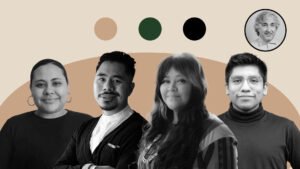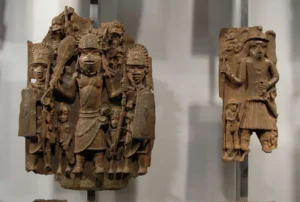
This article is the fifth in a series of articles that NPQ, in partnership with Hispanics in Philanthropy, will publish in the coming weeks. (You can read the prior installments here, here, here, and here). The series brings forward the voices of Latinx leaders within the nonprofit and philanthropy sectors to share their experiences on a range of economic justice issues that affect Latinx communities.

Four of the 22 cabinet members of the Biden administration are Latino or Latina, an amount that is roughly proportional to the percentage of Latinxs in the US population at large. But if one were to cast a glance at the nonprofit sector—or even more broadly at US cultural or political institutions—a very different picture emerges. Latinx people make up 18 percent of the US population, and yet:
- Only two percent of all local, state, and national elected offices are held by Latinxs nationally. In California, a state that is over 40 percent Latinx, it was not until 2021 that California had its first Latinx US senator, Alex Padilla.
- While 6 percent of Latinxs live in poverty and rely on the support of nonprofits, Latinxs account for only ten percent of nonprofit executive directors and less than three percent of foundation CEOs or presidents.
- Across the 100 top-grossing movies from 2007–2018, only three percent of films featured leads or co-leads with Latinx actors. Only four percent of films made between 2007 and 2018 had a Latin American or US Latinx director.
How do we change this disparity in representation? There are many paths, but a central lesson is clear: leaders are not just born, but made, and that process starts at the grassroots. When building a movement, finding and developing leaders are critical steps, and when taking them, it is essential to pay attention to the issues impacting our many and diverse communities.
Most often, it is best to begin with the leaders who already exist in our homes and our communities. If you are willing to look, you’ll find the leaders you seek. They are the teachers who organize student groups, the nurses who translate medical jargon to our Spanish-speaking parents and families, or the trans Latinas raising money for safe and stable places to call home. They are the grassroots leaders who have shown their dedication by working tirelessly with the Latinx community by building movements and alliances. Building movement leadership begins with recognizing that many of the leaders we seek are already present. In other words, building leadership starts with the recognition of the existing power, expertise, respect, and influence that many grassroots organizers hold, even if they don’t call themselves by that title.
Movements are created from building relationships out of necessity and support for the communities we love. Families develop relationships with neighbors, church congregations, and extended family to create a kin network of dependable mutual aid to be there for each other, even if the systems and representatives are not. Our families are often the best example of partnership and alliance building through traversing these systems to acquire everything from food and shelter to education and self-fulfillment. Mothers and caretakers shared strategies and solutions with each other as mechanisms to navigate harmful bureaucratic institutions. This information sharing is sometimes referred to as movidas, an ability to move through a system designed to keep people of color from accessing literal life-saving resources. Communities have always pushed and pulled on levers that created change and uplifted their families. As much as we continue to thrive in unfair systems, imagine the impact if the decision-makers were the ones from our communities.
Nonprofits are one of these structures that we can do something about. To truly reflect the communities they claim to serve, nonprofit organizations must actively seek out those connections.
Building Latinx Leadership in Nonprofits
Many Latinx leaders who enjoy recognition today went decades without the accolades and appreciation they so justly deserved. We have seen this through farmworker advocate Dolores Huerta, transgender rights activist Silvia Rivera, and countless others who continue to go unrecognized. In my 15 years of nonprofit advocacy experience, I have seen many such leaders go uncredited.
My first foray into the nonprofit world was working in the community education program at the Mexican American Legal Defense and Educational Fund (MALDEF). There, I witnessed firsthand how Latinx leaders were responsive and sustained change. The program team was led by three Latinas who shaped my understanding of how to lead by simply listening to the people in the community. They worked alongside parents in a yearlong leadership program that offered parents paths to be effective advocates for their children’s educational achievement. I watched how these women would sit and listen to the parents. They would return to the office and rethink lesson plans and reorganize calendars so that they could provide the most effective workshops. In turn, these Latinx parents would go on to become powerful advocates for their children’s academic success.
In short, a movement of Latinx grassroots leaders was built thanks to the MALDEF team’s familiarity with the local communities they worked with and, most importantly, their tenacity. By building a movement of leaders and helping these leaders hone their skills, they emboldened a base of Latinx parents to advocate effectively and win against a system that often ignores them.
Grassroots organizations are essential because they provide a path that leads to self-determination and foundational change. Grassroots leaders create consistent, genuine, and honest relationships that acknowledge the positionality and power that strengthens community and advocacy. Today, organizers understand that developing effective solutions for survival requires direct engagement with the folks who are surviving!
This, of course, is easier said than done; intersectional movement building is hard work. Somos Familia, of which I am a proud board member, is a California Bay Area organization founded when two parents identified a gap within the intersections of Latinx and queer communities. Two moms wanted to support their children and found little to no resources that spoke specifically to the LGBTQ Latinx community and how to best support the mental health of Latinx LGBTQ youth.
Sign up for our free newsletters
Subscribe to NPQ's newsletters to have our top stories delivered directly to your inbox.
By signing up, you agree to our privacy policy and terms of use, and to receive messages from NPQ and our partners.
A 2020 National Survey of LGBTQ Youth Mental Health found that “Latinx LGBTQ youth were 30 percent more likely to report a suicide attempt in the past year than non-Latinx LGBTQ youth.” Somos Familia provides bilingual education and workshops for Latinx families and service providers to better serve Latinx families with LGBTQ+ children and create safe school and home environments.
The founders of Somos Familia created a movement of Latinx parents and caregivers to address the needs of their LGBTQ loved ones who were falling through a societal crack. Somos Familia participant Leo Cuevas Ramos shared, “I first joined Somos Familia as a freshman in college looking to find community and acceptance as a trans-Latinx person. Five years later, through their guidance, I feel confident to lead and advocate for my communities.” Somos Familia stands as an example of how leaders are found in our homes and driven by love to create authentic and continuing change.
A shining example of grassroots leadership for immigrant communities, TODEC (Training Occupational Development Educating Communities) Legal Center is a California-based organization that empowers disenfranchised immigrant communities to become self-sufficient and ensure equitable access to critical resources. In the counties where it operates (Riverside, San Bernardino, and San Diego), nearly half of all Latinx families live in poverty; the organization is dedicated to building a movement of leaders through a lens of kindness, thoughtfulness, and true connection.
TODEC Legal Center’s membership is vibrant and intergenerational and is led by people most threatened by immigration raids, white supremacy, and regressive immigration policy proposals. Members of TODEC participate in training, organizing, and civic education to ensure that every person feels heard and their opinions are reflected in the decisions that affect them. Members visit with legislators and attend protest marches to influence the political process, favoring policies and laws that benefit immigrants.
TODEC’s executive director, Luz Gallegos, speaks to the conditions that so many Latinx residents of California face: “It is an inexplicable problem that immigrants provide the food that supports the nation but cannot provide their families with livable wages or access to health care.” For 40 years, TODEC has believed that Latinx immigrants and refugees working low-wage jobs are the primary agents of change. The nonprofit sector must take direction from leaders such as Gallegos, who understand that power does not come from the top but is driven by the many who recognize that change requires action.
The Need for an Intersectional Approach
The next generation of Latinx leaders must work with the lens of inclusion, denounce white supremacy, and work against anti-Blackness, homophobia, and transphobia. They need to understand that community-defined solutions are the key to sustaining change. The field must move past a simple numbers game and understand that the path to building a movement of leaders is intersectional. Latinx leaders must reflect and acknowledge the varying degrees of privilege many hold in a white supremacist society.
It is evident that having more Latinx people in positions of authority by itself does not always equate to the actual uplifting of communities. Despite the massive harm that ICE (US Immigration and Customs Enforcement) and Border Patrol have caused for the Latinx community as a whole, nearly 30 percent of ICE agents and an estimated 50 percent of Border Patrol agents identify as Latinx.
It is important that Latinx leaders understand that social injustices are intertwined in power structures that were built to divide and separate us. The building of Latinx leadership requires constant reflection and vulnerability. This means there is a need to provide ongoing education in Latinx communities to ensure a complete understanding of how the nation’s interlocking systems of oppression impact Latinx communities and other communities of color. To create a genuine movement that fosters leadership requires careful attention to the issues of representation, solidarity, and inclusion.
Latinx leaders need guidance and mentorship as they move through a world that was not designed to support their upward mobility. For those already established, that means building an organizational culture where there is space for emerging leaders to make mistakes and learn from them. This means responding with kindness, grace, and openness when that occurs.
Hiring and promoting Latinx-identified folks is an essential first step. But fostering leadership development requires more. It means creating the space for new leaders to grow, ask questions, and push themselves to think deeper about how to support not only our communities but the communities we stand with in solidarity. As Lilla Watson, a Murri visual artist and activist, stated, “If you have come here to help me, you are wasting your time. But if you have come because your liberation is bound up with mine, then let us work together.”
Latinx leaders must address how we stand in solidarity with Indigenous communities and how our privilege and proximity to whiteness perpetuates harm. It requires continual action to build and sustain alliances—and to recognize when other communities are not in the room. It requires engaging in respectful and authentic communication to forge strong relationships with community members and partners. It requires reflection on how Latinx norms can sometimes perpetuate sexism and patriarchy and take concrete actions to build a solidaristic culture that confronts and addresses those practices.
The nonprofit sector will fail if it does not recognize that Latinx identities are as complex as they are beautiful, resilient, and poised to create enduring change. To foster a strong and robust movement of Latinx leaders in nonprofits and beyond, it is critical to embrace those who are already doing the work, understand that Latinx people are not monolithic, and educate and uplift a more reflective next generation.









